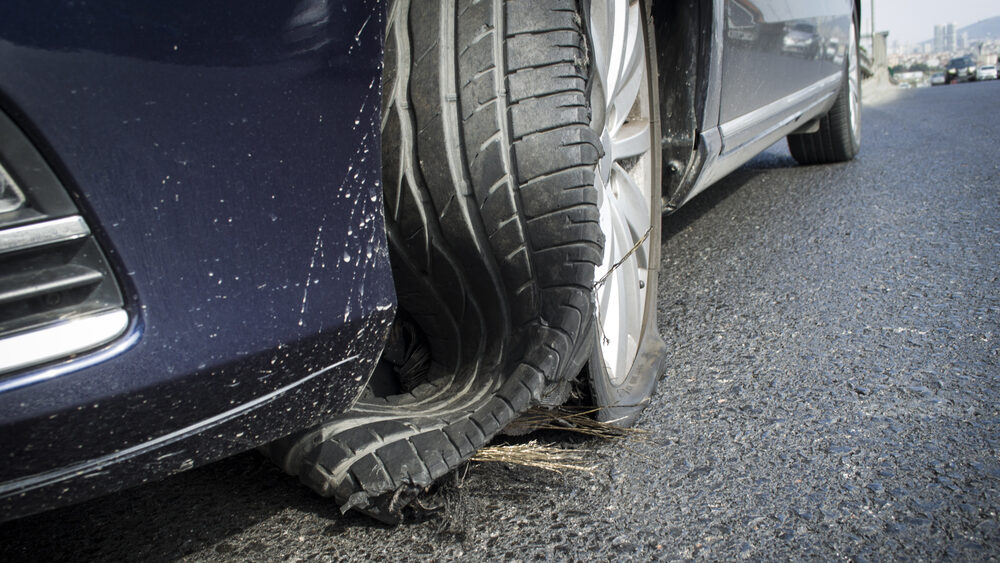Tire Failures and Car Accidents in Florida
October 12, 2023

Florida’s scenic drives, from coastal highways to inner-city roads, offer plenty of opportunities for motorists to enjoy their vehicles. Yet, as any seasoned driver knows, the integrity of a car rests not just on its engine or driver but heavily on its tires. Tire failures, although overlooked, can lead to severe accidents. At Feingold & Posner, P.A., we recognize the nuances of such incidents and aim to shed light on tire failures, their aftermath, and the legal aspects surrounding them in Florida.
Understanding Tire Failures
A tire failure or blowout refers to the sudden loss of air pressure in any of the vehicle’s tires. This unexpected deflation can lead to loss of vehicle control, especially when traveling at high speeds.
Common Causes of Tire Failures
Tire failures, often referred to as blowouts, can lead to catastrophic accidents, especially when vehicles are at high speeds. Understanding the common causes behind tire failures can help in preventing such events. Here are some of the leading causes:
- Tread Separation: One of the most common causes of tire blowouts is tread separation, which occurs when the treads on a tire become separated from the body of the tire. This can happen due to manufacturing defects, wear and tear, or prolonged use.
- Wear and Tear: Over time, tires naturally degrade. Driving on tires with low tread depth can compromise the tire’s grip, particularly on wet roads, making blowouts or hydroplaning more likely.
- Manufacturing Defects: Some tires may have inherent flaws from the production process, including weak spots in the rubber or issues with the tire’s internal structure.
- Improper Inflation: Both under-inflation and over-inflation strain the tire. An under-inflated tire generates excess heat from the additional flexing and movement. On the other hand, over-inflated tires are more susceptible to punctures and other external damage.
- External Damage: Road hazards like sharp objects, potholes, debris, or curbs can cause direct damage to the tires, leading to slow leaks or sudden blowouts.
- Overloading the Vehicle: Every tire has a maximum load capacity. Consistently overloading a vehicle puts extra stress on the tires, which can eventually lead to failure.
- Heat: Prolonged exposure to high temperatures can degrade the tire’s internal structure, increasing the chances of a blowout. Hot weather can cause the air inside the tires to expand, which may lead to over-inflation issues.
- Age: Even if a tire hasn’t seen much use, the rubber and other materials can degrade over time. Older tires, typically those over six years old, are more prone to failure.
- Poor Repairs: An improperly repaired puncture or use of unsuitable repair methods can weaken the tire’s structure.
- Mismatched Tires: Using mismatched tires (different types or sizes) on the same vehicle can lead to uneven wear and tear. This not only affects vehicle performance but can also contribute to tire failures.
- Chemical or Environmental Factors: Exposure to specific chemicals, oils, or extreme environmental conditions can compromise the integrity of the rubber in the tire.
It’s essential for vehicle owners to frequently inspect their tires for signs of wear, damage, or other issues. Regular maintenance, including rotations, balance checks, and proper inflation, can significantly reduce the risk of tire failures.
Florida’s Vulnerability
Florida’s climate and unique driving conditions contribute to higher risks:
- Heat: High temperatures can exacerbate existing tire issues. The heat expands the air inside, potentially leading to over-inflation situations.
- Wet Roads: Florida’s rainy seasons can be intense. Worn-out tires on wet roads can lead to hydroplaning and potential accidents.
Legal Ramifications and Liability
If a tire failure results in an accident, determining liability becomes crucial:
- Driver’s Responsibility: Florida law mandates that drivers maintain their vehicles, including tires, ensuring they’re safe for road use. If neglect can be proven, the driver might be held liable.
- Manufacturer Liability: If a tire’s design or manufacturing defect leads to an accident, the manufacturer can be held responsible. Product liability claims can arise in such situations.
- Third-Party Liability: Suppose another entity, like a mechanic or tire installation service, was recently involved in handling the tires and they failed due to their negligence. In that case, they could be held accountable.
- Comparative Negligence: Florida operates under a comparative negligence system. If multiple parties (including the victim) share fault, compensation may be divided based on each party’s percentage of blame.
Steps to Take After a Tire-Related Accident
A tire-related accident, commonly arising from a tire blowout or failure, can be sudden and unexpected. Being prepared and knowing the necessary steps to take afterwards can make a significant difference in your safety, legal protection, and potential compensation. Here are some steps to follow if you experience a tire-related accident:
- Ensure Safety: If possible and safe to do so, steer your vehicle to the side of the road, away from moving traffic. Activate your hazard lights.
- Call Emergency Services: Dial 911 or the local emergency number to report the accident, especially if there are injuries. Police can also help control traffic and secure the scene.
- Seek Medical Attention: Even if no injuries seem evident, it’s wise to get a medical evaluation. Some injuries, especially internal ones, might not manifest immediately.
- Document the Scene:
- Take photographs of the damaged tire, capturing any evident tread separations, punctures, or other issues.
- Photograph the accident scene, vehicle positions, road conditions, and any other relevant factors.
- If there are skid marks from your vehicle, photograph those too, as they can help determine the sequence of events.
- Gather Witness Information: If there are any witnesses to the accident, collect their names, contact details, and statements. They might provide crucial insights if there are any legal proceedings.
- Preserve the Tire and Other Evidence: If you suspect a tire defect caused the accident, keep the tire (and any pieces if it shattered) as evidence. This could be essential for any future investigations or product liability claims.
- Do Not Admit Fault: While it’s natural to want to discuss the accident, avoid admitting guilt or assigning blame at the scene. Statements made can potentially be used against you later.
- Contact Your Insurance Company: Inform your insurance provider about the accident. Provide factual details without admitting fault. If the tire failure was due to a manufacturing defect, they might help in pursuing claims against the tire manufacturer.
- Consult an Attorney: If you believe the tire’s malfunction was due to a defect or someone else’s negligence (like a repair service), consider consulting an attorney experienced in product liability or personal injury. They can guide you on potential compensation or legal action.
- Maintain Records: Keep a detailed record of everything related to the accident—photos, witness information, police reports, medical reports, repair bills, and any other related expenses. This will be valuable for insurance claims or potential legal actions.
- Seek Vehicle Repairs: Before getting back on the road, ensure your vehicle is thoroughly inspected and repaired by professionals. This includes replacing damaged tires and ensuring other tires are in good condition.
- Stay Updated on Recalls: Regularly check for tire recalls or reported defects. Manufacturers are required to inform customers of known issues, but it’s wise to be proactive.
In the wake of a tire-related accident, taking systematic, informed steps can ensure your safety, protect your rights, and position you favorably for any necessary legal or insurance procedures. Remember, it’s always beneficial to act with caution and seek expert advice when in doubt.
Contact an Experienced Car Accident Lawyer at Feingold & Posner, P.A for a Free Consultation About Your Case Today
Tire failures, while seemingly straightforward, can lead to intricate legal battles in Florida. Knowing the dynamics of such accidents, understanding potential liabilities, and being aware of your rights is paramount. At Feingold & Posner, P.A., we pride ourselves on our commitment to guiding accident victims toward rightful justice. If you or a loved one has been involved in a tire-related accident in Florida, reach out to us. Together, we can tread the path to resolution and restitution. Safe driving begins with awareness, and justice begins with action.

★
★
★
★
★
“These lawyers are not only very efficient, but caring as well. I would not hesitate to refer them to anyone.”
MATTHEW T. / FORMER CLIENT



